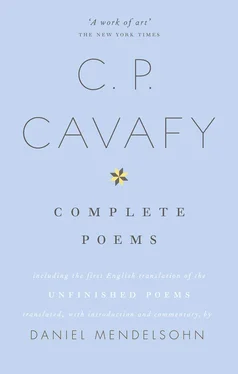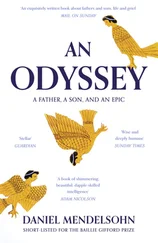A short word on Cavafy’s striking use of enjambment—the way he allows a sentence or thought to continue past a line break—is in order, because this device, too, puts interesting demands on the translator.
Cavafy’s use of this device is the more noteworthy because he is quite happy to eschew it altogether, as he does, for instance, in the poems “Whenever They Are Aroused” and “In the Church.” In the latter (which I quote below in its entirety), published probably in 1912, the lack of any spillover from line to line gives the poem just the right incantatory, ecclesiastical feel:
I love the church—its labara,
the silver of its vessels, its candelabra,
the lights, its icons, its lectern.
When I enter there, inside of a Greek Church:
with the aromas of its incenses,
the liturgical chanting and harmonies,
the magnificent appearance of the priests,
and the rhythm of their every movement—
resplendent in their ornate vestments—
my thoughts turn to the great glories of our race,
to our Byzantium, illustrious.
With this we might compare another, historical poem of 1912, “Alexandrian Kings.” Here Cavafy describes the magnificent ceremony, staged in Alexandria by Antony and Cleopatra in 34 B.C., at which the power-hungry royal couple publicly proclaimed Cleopatra’s still-small sons (aged thirteen, six, and two) the rulers of a number of foreign possessions stretching far into Asia—an event that demonstrated the couple’s international aspirations, even as the ironic contrast between the magnificence of the honorifics and the tender age of their recipients, made much of in this poem, highlights the ruthless ambition of the royal parents.
Cavafy’s characteristic interest in the ironies of this occasion is evident precisely in his use of enjambment. Take, for instance, the first few lines of the poem:
The Alexandrians came out in droves
to have a look at Cleopatra’s children:
Caesarion, and also his little brothers,
Alexander and Ptolemy, who for the first
time were being taken to the Gymnasium.
The first instance of enjambment—“came out in droves / to have a look”—underscores the ardent curiosity of the local populace, and hence emphasizes the dazzling nature of the occasion (while hinting at the locals’ cynicism about political displays, which is, in fact, emphasized later on in the poem). The second instance—“who for the first / time were being taken”—places extraordinary emphasis on the noun time by separating it from its adjective, first, which is also thereby emphasized: an emphasis that reminds us of the youth and inexperience of the children who are being so cynically exploited by their parents.
To turn to a work from the poet’s latest phase, the final stanza of the great 1930 poem “The Mirror in the Entrance” suggests how Cavafy continued to hone his handling of this technique. The poem describes an occasion on which a beautiful youth employed by a tailor makes a delivery to a wealthy home; while he waits for a receipt, alone in the vestibule, he approaches an old mirror and fixes his tie, unaware that the mirror itself—here a double for the poet—is, as it were, “watching” him. The poem ends with a description of the mirror’s feelings:
But the ancient mirror, which had seen and seen again,
throughout its lifetime of so many years,
thousands of objects and faces—
but the ancient mirror now became elated,
inflated with pride, because it had received upon itself
perfect beauty, for a few minutes.
Except for the final two lines, each line is a grammatically independent unit ending with some kind of punctuation—a comma or a dash. Coming at the end of this series of discrete phrases, the penultimate line, which can only be logically and grammatically completed by the line that follows, takes on a tremendous drama and excitement: by withholding the object of the verb “received” until the next line, the poet gives the all-important word “beauty” an enormous climactic force.
Given the importance of this technique in Cavafy’s prosody, the meticulous care with which he constructed each line, I’ve tried to structure the English of these translations so that it achieves the same effect.
One final note, concerning a choice on my part that might strike some readers as controversial. In rendering Greek names from the Classical, Hellenistic, Late Antique, and Byzantine past, I have consistently chosen to eschew a phonetic rendering of the way those names sound in Greek, opting instead to adopt the traditional, Latinate forms—which is to say, the forms that will be familiar to English speakers. To my mind, mimicking the contemporary Greek pronunciation of the names of the historical or pseudohistorical characters is, at best, inappropriate and indeed unhelpful in an English translation. When the Greek eye sees the name , the person brought to mind is the person brought to mind when the eye of an English-speaking person comes across the name “Justinian”; transliterating it as “Ioustinianos” is to obscure, rather than translate, Cavafy’s text.
Worse, a misguided allegiance to the sound of Modern Greek can lead to a serious misrepresentation of a poem’s deeper meanings. To take “The Seleucid’s Displeasure” once more: certain translators have chosen to render the title of this poem as “The Displeasure of Selefkidis”—that last word being an accurate phonetic reproduction of what the Greek word , which indeed appears in the poem’s title, sounds like. But this choice conveys the entirely false impression that “Selefkidis” is someone’s name, whereas, as we know, the word refers here to a member of the Seleucid dynasty —someone whose name was, in fact, Demetrius. The word “Seleucid” in this poem is therefore a crucial part of its meaning, one that rests on our ability to grasp the great, if rather pathetic, pride that Demetrius took in the fact that he was a Hellenistic monarch—a Seleucid. A fluent speaker and tireless reader of English, Cavafy himself was familiar with the Latinate forms of these names from his extensive reading in English works of history and philology—Gibbon, J. B. Bury, many others—and used these forms himself when writing in English. Not least for that reason, I have done the same.
THE PRESENT VOLUME collects all of the known poetic work of Cavafy. Because of the complexities of their publication history, the organization of the poems in the pages that follow merits brief comment.
Although he published a small number of verses, most of them when he was young, in literary journals and annuals, Cavafy had for most of his career a highly idiosyncratic method of presenting his poems, and never published a definitive collection of them in book form. He preferred, instead, to have poems printed at his own expense as broadsheets or in pamphlets, which he would distribute to a select group of friends and admirers. Among other things, this method allowed the poet to treat every poem as a work in progress; friends recalled that he often went on emending poems after they had been printed. In an essay called Independence, the poet articulated what was clearly a kind of anxiety about the finality associated with publication:
When the writer knows pretty well that only very few volumes of his edition will be bought … he obtains a great freedom in his creative work. The writer who has in view the certainty, or at least the probability of selling all his edition, and perhaps subsequent editions, is sometimes influenced by their future sale … almost without meaning to, almost without realizing—there will be moments when, knowing how the public thinks and what it likes and what it will buy, he will make some little sacrifices—he will phrase this bit differently, and leave out that. And there is nothing more destructive for Art (I tremble at the mere thought of it) than that this bit should be differently phrased or that bit omitted.
Читать дальше












